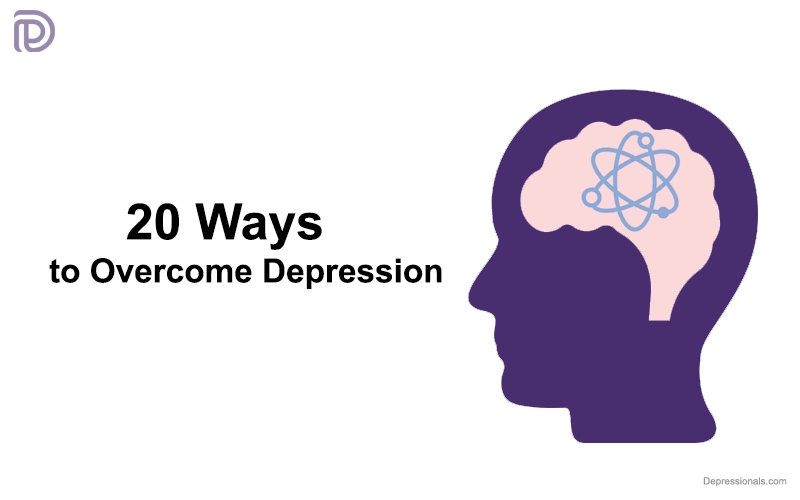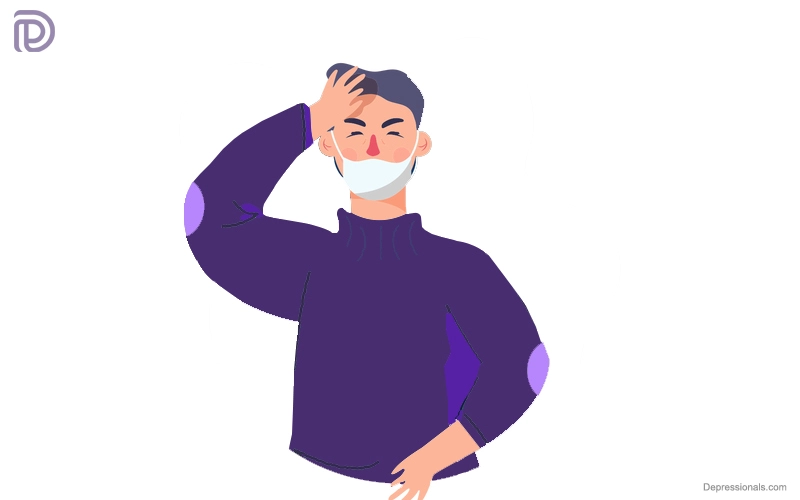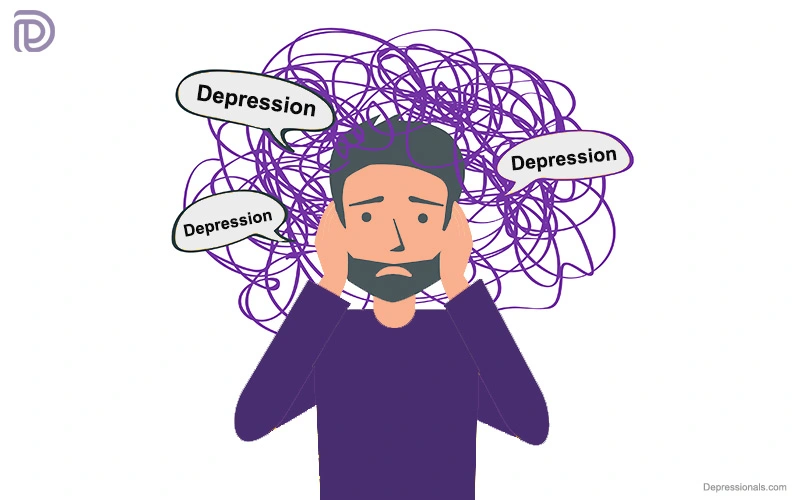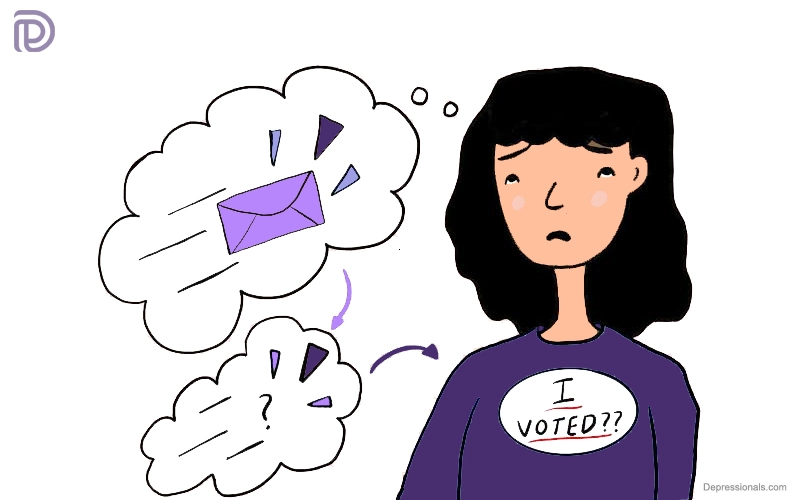Learn 20 effective treatments guide on how to overcome depression. You can feel tired and empty when you suffer from depression. When this happens, it can be difficult to summon the strength from within or to wish to reach out for help.
It’s important to know the facts about depression. Depression is a mental illness and isn’t caused by laziness or a reaction to grief or discouragement that we’re prone to.
However, there are small things you can do to improve your overall feeling of well-being and feel more in control.
Continue reading for a few tips on incorporating these strategies effectively.
Read: Persistent Depressive Disorder
1. Know where you stand
It is common to experience depression. Millions of people are affected by it, including some close to you. It is possible that you don’t realize how similar these challenges, emotions, and obstacles are.
This disorder brings new challenges every day. In order to keep your mental health in check, you need to accept that where you are now may not remain the same for the foreseeable future.
To treat yourself effectively from depression, you must be open, accepting, and loving to yourself and everything you’re going through.
2. Take time to wallow – but attempt to do so in a constructive way
Suppressing your emotions and feelings may seem like a good way to cope with depression’s negative symptoms. However, this practice is ultimately unhealthy.
When you’re having a bad day, enjoy it. Allow yourself to feel your emotions – but don’t let them consume you.
You might want to consider writing or keeping a journal about your experiences. You can also write about that when the feelings subside.
It can be instructive to observe the ebb and flow of depression symptoms for self-healing as well as encouraging.
3. Know that the present does not predict the future
Moods, emotions, and thoughts of today do not belong to tomorrow.
In the event that you were unsuccessful today in achieving your goals, keep in mind that you have the opportunity to try again when you wake up tomorrow.
Accept the fact that there will be difficult days as well as great days for you. Try to look forward to tomorrow’s fresh start.
Check: Major Depression Disorder
4. Don’t generalize; instead, evaluate the parts
Recollections can be tainted with negative emotions when a person is depressed. When something goes wrong, we tend to focus on what went wrong rather than what went right.
Don’t generalize too much. Encourage yourself to see what’s good. You may find it helpful to list the things you enjoyed about the event or day. If something went wrong, write it down.
You might be able to direct your thoughts away from the whole and toward the pieces that were positive by observing the weight you’re giving to one thing.
5. Don’t listen to the depression voice
An irrational, negative voice in your head could sabotage your attempts at self-help. However, you can learn to replace it if you can recognize it. Make logic your weapon. Every thought should be addressed separately.
If you feel like something won’t be fun or worth your time, tell yourself, “Maybe you’re right, but it’ll be better than sitting here another night.” Soon you’ll find that negative thinking isn’t always realistic.
Recommended: Multiple Strategies To Control Overthinking

Related: How to Deal with Teenage Depression
6. Set realistic goals
If you have a long to-do list, you may prefer to do nothing. If you want to accomplish a lot of things, set a few smaller goals instead.
For example:
- Take out the trash instead of cleaning the house.
- Sort the piles of laundry by color rather than doing the entire pile.
- Don’t delete all messages in your inbox; just respond to time-sensitive messages.
Start by doing one small thing, then another, then another, and another. You will end up with a list of tangible accomplishments rather than an untouched to-do list.
7. Reward your efforts
Every achievement deserves acknowledgment, and every goal deserves celebration. Do your best to acknowledge the achievement of a goal.
Recognizing your own accomplishments can be a very powerful tool in the battle against depression’s negative weight. It may not feel like celebrating with confetti and cake, but it can make you feel better.
A memory of a good job can be especially useful in fending off negative talk or generalization.
Read: Economic Depression
8. You may find it useful to set up a routine.
A gentle schedule may enhance your sense of control if depression disrupts your daily routine. However, these plans do not have to cover the entire day.
Identify times when you are feeling unorganized or scattered.
Before you go to bed or before you leave for work, you can plan your schedule accordingly. It may be limited to the weekends only. Develop a routine that is loose but structured that will help you stay on top of things throughout your day.
9. Find something you like to do
It’s common for depression to make you feel fatigued. Emotions like this can be stronger than happy ones.
Consider pushing back and doing something you enjoy – something that is relaxing and energizing. A musician, painter, hiker, or biker could be interested in those activities.
Exercise can boost your energy and mood, which may aid you in defeating your symptoms.
10. Listen to music
There is research to show that music can improve your mood and alleviate symptoms of depression. You can also strengthen the way you receive positive emotions through it.
Group music performances, such as a band or ensemble, can be particularly beneficial. it is also possible to reap many of the same benefits by simply listening.
Related: How to Help Someone with Depression
11. Spend time in nature
Depression can be greatly influenced by Mother Nature. Researchers have found that spending time in nature can improve mental health.
The same benefits may be derived from exposure to sunlight. This can temporarily boost your mood by increasing your serotonin levels.
Take a walk in your local park or take a stroll among the trees at lunchtime. You could also plan a hike for the weekend. These activities provide a great way to soak up some rays while interacting with nature.
12. Spend time with loved ones
You may be tempted to isolate yourself and withdraw from friends and family when you are depressed, but spending time with them can help to wash away those tendencies.
You can also use video conferencing if you cannot meet in person. Keep in mind that these people care for you. Don’t let yourself feel like a burden. Interaction is important – and they likely need it, too.
Read: How to Get Out of a Depressive Episode
13. Explore new things
You use the same part of your brain every day when you do the same thing. You can significantly modify your brain chemistry and challenge your neurons by doing something completely different.
Research has also shown that trying new things improves your overall well-being and improves your social relationships.
Try a new sport, enroll in a creative class, or learn a new cooking technique to reap these benefits.
14. Volunteering can be a great way to do both
Giving your time and money to someone or something else can help you accomplish many things at once – including meeting new people and learning something new.
It may be more beneficial for you to provide help to friends than to receive it, even though you’re used to receiving help from friends.
Furthermore, volunteering has physical benefits as well. It also reduces the risk of hypertension.
15. You can also use this as a way to practice gratitude
You may find that taking time to acknowledge your gratitude for doing something you love, or even finding a new activity that you enjoy, is more likely to boost your mental health.
A study shows that gratitude can enhance your psychological well-being.
Moreover, expressing your gratitude in writing – even to others – can be a particularly meaningful practice.
Read: Situational Depression
16. Meditation can help you ground your thoughts
Depression symptoms can be prolonged by stress and anxiety. Stress can be reduced and joy and balance can be brought into your life by learning relaxation techniques.
It has been shown that practicing meditation, yoga, deep breathing, or even journaling can help you gain a sense of wellbeing and feel more connected to the world around you.
17. Eating and drinking can also affect how you feel
Depression cannot be cured with a magic diet. However, the food you consume has a direct impact on the way you feel. Eating a diet rich in vegetables, grains, and lean meats may be an excellent place to start. Avoid stimulants like caffeine, soda, and coffee, as well as depressants like alcohol.
Avoiding sugar, preservatives, and processed foods can also make some people feel better and more energetic. Getting advice from a registered dietitian or a doctor is a good idea if you have the means.
18. If you are up for exercise, walk around the block
Exercise might seem like the last thing you want to do on days when you are too tired to even get out of bed. The good news is that exercising and staying active are powerful ways to combat depression.
According to research, one of the most effective ways to relieve depression symptoms is through exercise. Depressive episodes may also be prevented with this method.
Make sure you walk around the block if you are able. Get started by walking for five minutes, then increase the duration from there.
19. Getting enough sleep is also important
Depression is associated with sleep disturbances. Sleeping too much or not well may be the problem. Depression symptoms may be made worse by both factors.
During the night, you should aim to sleep for eight hours. Make sure you get a good night’s sleep.
Your schedule will be easier if you go to bed and wake up at the same time every day. Additionally, it may help you to feel more balanced, energized, and focused throughout the day if you get plenty of sleep.
Related: Sleep Disorders
20. Consider clinical treatment
Speaking to a professional may also help you understand what you’re going through. If your general practitioner believes you need therapy or other special treatment, he or she can refer you.
Depending on your symptoms, they can create a custom-tailored treatment plan for you. Treatment may include traditional methods like medication and therapy, as well as alternative approaches like acupuncture.
You may need to try several treatments before finding the right one for you, so discuss with your doctor what is working and what isn’t. The mental health professional will consult with you about the best option for your needs on how to overcome depression.






Wonderful article! We are linking to this great post on our website.
Keep up the great writing.
I believe that is among the such a lot significant information for me. And i am happy reading your article. But want to statement on few basic things, The site taste is wonderful, the articles is in point of fact excellent : D. Just right job, cheers
This is very informative.
Hello, I’m very impressed by this piece of writing. Very detailed written.